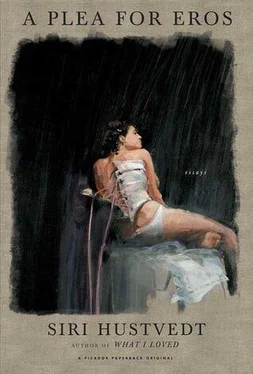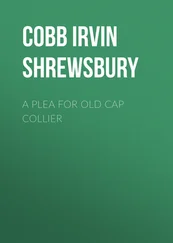Nick Carraway hops a train and finds himself in the bond trade and living next door to Gatsby’s huge mansion: a house built of wishes. All wishes, however wrongheaded, however great or noble or ephemeral, must have an object, and that object is usually more ideal than real. The nature of Gatsby’s wish is fully articulated in the book. Gatsby is great, because his dream is all-consuming and every bit of his strength and breath is in it. He is a creature of will, and the beauty of his will overreaches the tawdriness of his real object: Daisy. But the secret of the story is that there is no great Gatsby without Nick Carraway, only Gatsby, because Nick is the only one who is able to see the greatness of Gatsby’s wish.
Reading the book again, I was struck by the strangeness of a single sentence that seemed to glitter like a golden key to the story. It occurs when a dazed Gatsby finds his wish granted and he is showing Daisy around the West Egg mansion. Nick is, as always, the third wheel. “I tried to go then,” he says, “but they wouldn’t hear of it; perhaps my presence made them feel more satisfactorily alone.” The question is: In what way are two people more satisfactorily alone when somebody else is present? What on earth does this mean? I have always felt that there is a triangular quality to every love affair. There are two lovers and a third element — the idea of being in love itself. I wonder if it is possible to fall in love without this third presence, an imaginary witness to love as a thing of wonder, cast in the glow of our deepest stories about ourselves. It is as if Nick’s eyes satisfy this third element, as if he embodies for the lovers the essential self-consciousness of love — a third-person account. When I read Charles Scribner Ill’s introduction to my paperback edition, I was not at all surprised that an early draft of the novel was written by Fitzgerald in the third person. Lowering the narration into the voice of a character inside the story allows the writer to inhabit more fully the interstices of narrative itself.
The role of the onlooker is given quasi-supernatural status in the book in the form of the bespectacled eyes of T. J. Eckle-burg, and it is to this faded billboard of an oculist in Queens that the grieving Wilson addresses his prayer: “You can’t hide from God.” When his friend tells him, “That’s an advertisement,” Wilson doesn’t answer. The man needs an omniscient third person, and he finds it in Eckleburg, with his huge staring eyes. This speech occurs when Nick is not present, and yet the quality of the narration does not change. It is as if he were present. Nick’s stand-in is a neighbor of Wilson’s, Michaelis, who has presumably reported the scene to the narrator, but the reader isn’t told this directly. Together, Michaelis and Nick Carraway form a complementary narration that finds transcendence in the image of Eckleburg’s all-seeing, all-knowing eyes, a figure very like the third-person narrator of nineteenth-century novels who looks down on his creatures and their follies.
There is only one other noticeable pair of spectacles in the novel, those worn by “the owl-eyed man.” One of Gatsby’s hundreds of anonymous guests, he is first seen in the “Gothic library,” a drunken fellow muttering excitedly that the books “are absolutely real.” He had expected cardboard, he tells Nick and Jordan, and cannot get over his astonishment at the reality of these volumes. The owl-eyed man returns near the end of the book as Gatsby’s only mourner besides the dead man’s father and Nick. Like the image of Eckleburg, the owl-eyed man is both thoroughly mysterious and thoroughly banal. He tells Nick and Jordan that he’s been drunk for a week and that he thought the books might help “sober” him up. Nameless, the man is associated exclusively with the library and his large glasses. Nick does not ask the owl-eyed man to attend the funeral. He has kept the day and place a secret to avoid gawkers and the press, but, out of nowhere, the man makes his appearance in the rain, and during that time he removes his glasses twice. The second time, he wipes them, “outside and in.” I can see him doing it. For me the gesture is intimate, and although no handkerchief is mentioned, I see a white handkerchief, too, moving over the rain-spattered lenses. The cleaning of the glasses is ordinary and magical. The strange man is a second, specifically literary incarnation of Eckleburg, a witness to the problem of what’s real and what isn’t, a problem that is turned inside out through the idea of seeing through special glasses —the glasses of fiction.
The Great Gatsby is an oddly immaterial novel. In it there are only two characters with bodies that mean anything, bodies of vigor and appetite: Tom Buchanan and his mistress, Myrtle Wilson, whose alliance causes the book’s tragedy. The rest of them, Gatsby, the hordes of guests, Jordan, and, above all, Daisy, seem to be curiously unanchored to the ground. They are pastel beings, beings of light and sound — creatures of the imagination. At Gatsby’s parties, “men and girls” come and go “like moths,” accompanied by an orchestra as if they were characters in a play or a movie. When Nick first sees Daisy and Jordan in East Egg, the girls are reclining on a huge sofa. “They were both in white, and their dresses were rippling and fluttering as if they had just been blown back in after a short flight around the room.” They are as weightless as dollar bills, or maybe hundred-dollar bills, blown up in a wind before they settle again to the ground, and whether or not Fitzgerald intended this lightness as another image of money in his novel, money is the source of the charm that envelops the ethereal creatures. Daisy’s music is her own “thrilling” voice, and it sounds, as Gatsby says, “like money.” But Nick is the one who elaborates on its timbre. In it he hears the jingle of coins and the rain of gold in fairy tales.
It may be that New York and its environs is the best place in the world to feel this particular bewitchment that all the pieties about honest poverty cannot disperse. Fitzgerald is right. Money in the Midwest may be respectable and it may even be considerable, but it is nothing like New York money. There was no money where I grew up, no “real” money, that is. The turkey farmers did well, and the dentists in town had a certain affluent shine to them, but, on the whole, status was measured in increments — a new economy car, unused skates, an automatic garage door opener — and there was a feeling that it was wrong to have much more money than anybody else, and downright sinful to flaunt it if you had it. When I arrived in New York, the money I saw flabbergasted me. It sashayed on Fifth Avenue and giggled in galleries and generally showed itself off with such unabashed glee that it was impossible not to admire it or envy it, at least a little. And what I saw during my travels through the city in the early 1980s was no different from what Nick saw. Money casts a glow over things, a glow all the more powerful to people who haven’t got it. No matter how clean or morally upright, poverty has cracks and corners of ugliness that nothing but money can close, and I remember the sense of relief and pleasure that would come over me when I sat in a good restaurant with white tablecloths and shining silver and flowers and I knew that my date was a person who could afford to pay. And it happened during my lonely, impoverished student days that a man would lean across the table and invite me to an island or to another country or to a seaside resort, to an East Egg or a West Egg, and the truth was that the smell of money would waft over me, its scent like a torpor-inducing drug, and had there been no Middle West, no Northfield, Minnesota, no home with its strident Lutheran sanctions, no invisible parental eyes always watching me — in short: had I been somebody else — I might have been blown off to an Egg in a gust of wind and floated across the beach and out into the Sound to the strains of some foolish but melodic accompaniment.
Читать дальше












